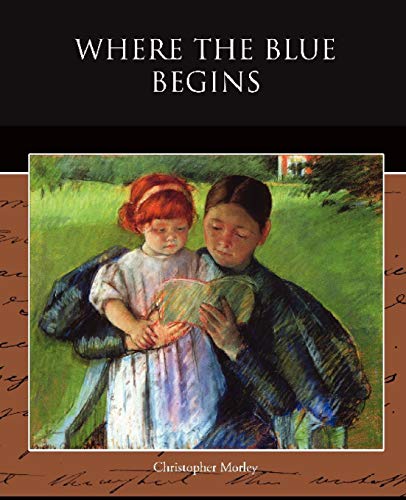-
Where the Blue Begins
Christopher Morley
language (, May 12, 2012)This book was converted from its physical edition to the digital format by a community of volunteers. You may find it for free on the web. Purchase of the Kindle edition includes wireless delivery.
-
Where the Blue Begins
Morley, Christopher,
language (Pomona Press, May 8, 2015)This wonderful story by Christopher Morley is the humourous tale of an anthropomorphised dog called Mr. Gissing and his search for truth, god and the meaning of life. Christopher Morley was a well known American journalist, novelist and essayist. His works include The Eighth Sin (1912), Parnassus on Wheels (1917), Haunted Bookshop (1919), Pipefuls (1920) and many others. This book, Where the Blue Begins was originally published in 1922 and is here republished with a new biography of the author. A delicious satirical fantasy, in which humanity wears a dog collar.'Mr. Morley is a master of consequent inconsequence. His humour and irony are excellent, and his satire is only the more salient for the delicate and ingenuous fantasy in which it is set.' Manchester Guardian.
-
Where the Blue Begins
Christopher Morley
language (Library of Alexandria, July 29, 2009)Gissing lived alone (except for his Japanese butler) in a little house in the country, in that woodland suburb region called the Canine Estates. He lived comfortably and thoughtfully, as bachelors often do. He came of a respectable family, who had always conducted themselves calmly and without too much argument. They had bequeathed him just enough income to live on cheerfully, without display but without having to do addition and subtraction at the end of the month and then tear up the paper lest Fuji (the butler) should see it. It was strange, since Gissing was so pleasantly situated in life, that he got into these curious adventures that I have to relate. I do not attempt to explain it. He had no responsibilities, not even a motor car, for his tastes were surprisingly simple. If he happened to be spending an evening at the country club, and a rainstorm came down, he did not worry about getting home. He would sit by the fire and chuckle to see the married members creep away one by one. He would get out his pipe and sleep that night at the club, after telephoning Fuji not to sit up for him. When he felt like it he used to read in bed, and even smoke in bed. When he went to town to the theatre, he would spend the night at a hotel to avoid the fatigue of the long ride on the 11:44 train. He chose a different hotel each time, so that it was always an Adventure. He had a great deal of fun. But having fun is not quite the same as being happy. Even an income of 1000 bones a year does not answer all questions. That charming little house among the groves and thickets seemed to him surrounded by strange whispers and quiet voices. He was uneasy. He was restless, and did not know why. It was his theory that discipline must be maintained in the household, so he did not tell Fuji his feelings. Even when he was alone, he always kept up a certain formality in the domestic routine. Fuji would lay out his dinner jacket on the bed: he dressed, came down to the dining room with quiet dignity, and the evening meal was served by candle-light. As long as Fuji was at work, Gissing sat carefully in the armchair by the hearth, smoking a cigar and pretending to read the paper. But as soon as the butler had gone upstairs, Gissing always kicked off his dinner suit and stiff shirt, and lay down on the hearth-rug. But he did not sleep. He would watch the wings of flame gilding the dark throat of the chimney, and his mind seemed drawn upward on that rush of light, up into the pure chill air where the moon was riding among sluggish thick floes of cloud. In the darkness he heard chiming voices, wheedling and tantalizing. One night he was walking on his little verandah. Between rafts of silver-edged clouds were channels of ocean-blue sky, inconceivably deep and transparent. The air was serene, with a faint acid taste. Suddenly there shrilled a soft, sweet, melancholy whistle, earnestly repeated. It seemed to come from the little pond in the near-by copses. It struck him strangely. It might be anything, he thought. He ran furiously through the field, and to the brim of the pond. He could find nothing, all was silent. Then the whistlings broke out again, all round him, maddeningly. This kept on, night after night. The parson, whom he consulted, said it was only frogs; but Gissing told the constable he thought God had something to do with it
-
Where the Blue Begins
Christopher Morley
(CreateSpace Independent Publishing Platform, April 14, 2013)Each in turn may call this a fairy story, a dog story, an allegory or a satire, but all will be moved by the beauty and the meaning--a beauty and a meaning that seems to live within the realm of those books that go on and on making friends and spreading enchantment. Gissing, its hero, is a dog who searches the world for an ideal, and then finds in the smoke of his own furnace fire a hint of the heavenly blue that he had been seeking.
-
Where the Blue Begins
1890-1957 Morley, Christopher
language (HardPress, June 21, 2016)HardPress Classic Books Series
-
Where the Blue Begins
Christopher Morley
language (Pomona Press, April 15, 2014)In a society of anthropomorphised canines, Gissing, a debonair young dog about town, adopts some orphaned puppies and begins to yearn for a more meaningful existence than his pleasant life in suburban Canine Estates. Simultaneously a fairy tale, a story about dogs, an allegory, and a satire, this fantastic and thought-provoking story full of beauty and meaning is worthy of a place on any bookshelf and is highly recommended for fans and collectors of Morley’s work. Christopher Morley (1890 - 1957) was an American novelist, poet, and journalist. Many antiquarian books such as this are increasingly hard to come by and expensive, and it is with this in mind that we are republishing this book now in an affordable, modern, high-quality edition. It comes complete with a specially commissioned new biography of the author.
-
Where the blue begins; a divine comedy
Christopher Darlington Morley, Ernest Shaffer Colling
(Doubleday, Page & Co., July 6, 1922)Physical description; x, 227 p., [4] leaves of plates : ill. (some col.) ; 26 cm. Subject; Dogs — Fiction.
-
Where the Blue Begins
Christopher Morley, Taylor Anderson
(CreateSpace Independent Publishing Platform, March 14, 2018)Odin’s Library Classics is dedicated to bringing the world the best of humankind’s literature from throughout the ages. Carefully selected, each work is unabridged from classic works of fiction, nonfiction, poetry, or drama.
-
Where the Blue Begins
Christopher Morley
(Pomona Press, Oct. 31, 2014)A delicious satirical fantasy, in which humanity wears a dog collar.'Mr. Morley is a master of consequent inconsequence. His humour and irony are excellent, and his satire is only the more salient for the delicate and ingenuous fantasy in which it is set.' Manchester Guardian
-
Where the blue begins,
Christopher Morley
(W. Heinemann Ltd. [etc., etc, July 6, 1925)None
-
Where the Blue Begins
Christopher Morley, 1st World Publishing, 1stworld Publishing
(1st World Library - Literary Society, Dec. 30, 2007)A toast proposed at the Johnson Birthday Celebration held at the Three Crowns Inn, Lichfield, in September, 1906. In rising to propose this toast I cannot ignore what must be in many of your minds, the recollection that last year it was submitted by a very dear friend of my own, who, alas! has now gone to his rest, I mean Dr. Richard Garnett. {3} Many of you who heard him in this place will recall, with kindly memories, that venerable scholar. I am one of those who, in the interval have stood beside his open grave; and I know you will permit me to testify here to the fact that rarely has such brilliant scholarship been combined with so kindly a nature, and with so much generosity to other workers in the literary field. One may sigh that it is not possible to perpetuate for all time for the benefit of others the vast mass of learning which such men as Dr. Garnett are able to accumulate. One may lament even more that one is not able to present in some concrete form, as an example to those who follow, his fine qualities of heart and mind-his generous faculty for 'helping lame dogs over stiles.'
-
Where the Blue Begins
Christopher Morley
(Book Jungle, July 1, 2009)Christopher Morley (1890-1957) was an American poet, novelist, essayist, and journalist. He attended Oxford as a Rhodes scholar. He worked at Doubleday as a publicist and publisher's assistant. Morley was one of the first judges for The Book of The Month Club. This is a book that can be enjoyed by children and adults. As a child it is entertaining. As an adult more meanings are found. Morley's basic message is do not be afraid to look for your dreams. At the same time do not be surprised if what you seek can be found right at home.